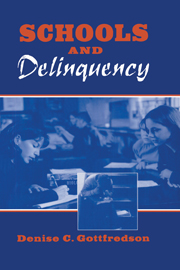Book contents
- Frontmatter
- Contents
- List of Tables and Figure
- Acknowledgments
- 1 School's Potential as a Location for Delinquency Prevention
- 2 School-Related Individual Characteristics, Attitudes, and Experiences
- 3 School Effects
- 4 Field Studies of School-Based Prevention: An Overview
- 5 Changing School and Classroom Environments: The Field Studies
- 6 Changing Student Personality, Attitudes, and Beliefs: The Field Studies
- 7 Lost in Translation: Why Doesn't School-Based Prevention Work as Well as It Should?
- 8 Where Do We Go from Here?
- References
- Author Index
- Subject Index
1 - School's Potential as a Location for Delinquency Prevention
Published online by Cambridge University Press: 05 August 2011
- Frontmatter
- Contents
- List of Tables and Figure
- Acknowledgments
- 1 School's Potential as a Location for Delinquency Prevention
- 2 School-Related Individual Characteristics, Attitudes, and Experiences
- 3 School Effects
- 4 Field Studies of School-Based Prevention: An Overview
- 5 Changing School and Classroom Environments: The Field Studies
- 6 Changing Student Personality, Attitudes, and Beliefs: The Field Studies
- 7 Lost in Translation: Why Doesn't School-Based Prevention Work as Well as It Should?
- 8 Where Do We Go from Here?
- References
- Author Index
- Subject Index
Summary
The salutary effects of school experiences are ordinarily taken very much for granted by most parents, teachers, principals, and others. … In the case of the … delinquent sample of school children who were manifesting aggressive-delinquent behavior, however, much of the school data point to a multiplicity of unwholesome, unsatisfactory, unhappy, and frustrating situations in which the delinquents were enmeshed. These data suggest that the school may be full of predisposing stimuli which elicit aggression responses on the part of the maladjusted child.
(Kvaraceus, 1945, p. 135)One of the situations in which children of all social levels come together and compete for status in terms of the same set of middle-class criteria and in which working-class children are most likely to be found wanting is in the school. … To the degree to which [a boy] values middle-class status, either because he values the good opinion of middle-class persons or because he has to some degree internalized middle-class standards himself, he faces a problem of adjustment and is in the market for a “solution.” The delinquent subculture, we suggest, is a way of dealing with the problems of adjustment we have just described.
(Cohen, 1955, pp. 112, 119, 121)If the adolescent male fails in school or drops out, or for other reasons finds school roles unsatisfactory or unplayable, he finds himself in an institutional void. […]
- Type
- Chapter
- Information
- Schools and Delinquency , pp. 1 - 24Publisher: Cambridge University PressPrint publication year: 2000



